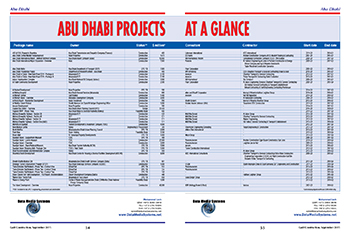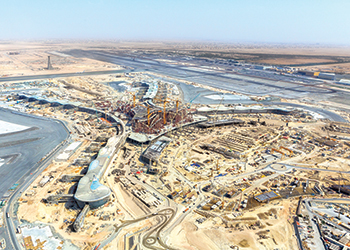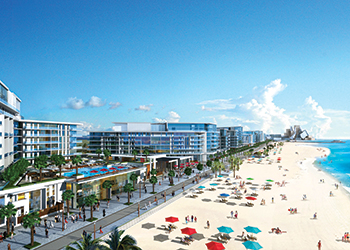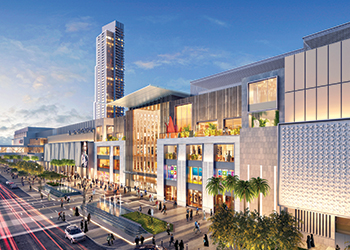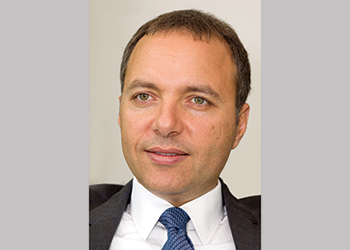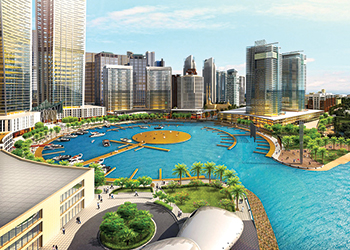
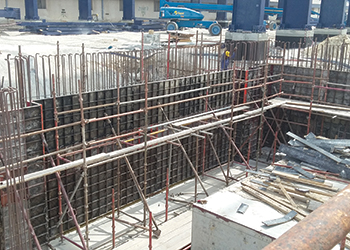 Galvanising tank at Al Ghurair Iron and Steel Factory ... double-sided wall.
Galvanising tank at Al Ghurair Iron and Steel Factory ... double-sided wall.
Formwork systems from Paschal-Werk G Maier continue to enjoy popularity among contractors in the Abu Dhabi market, where a number of leading players are also taking advantage of the German company’s formwork rental services offered through its local branch Paschal Emirates.
Among such contractors is Al Hassan Engineering, which is currently using Paschal’s modular formwork systems for the construction of a substation in Mirfa and the expansion of Al Ghurair Iron and Steel Factory in Mussafah, according Amir Delghandi, general director of Paschal Concrete Forms, the Bahrain-based regional office of the German formwork specialist.
For the Mirfa substation works, Al Hassan Engineering has procured the systems on a hire-and-purchase basis for five months, for the construction of walls with columns as well as columns, he says. The contractor has also leased Paschal’s formwork for a month for the construction of a galvanising storage tank for the Al Ghurair Iron and Steel Factory expansion project.
Among other projects, Al Hassan Engineering recently successfully completed work on a new 400/200/33 kV grid station – Bab (Bab-2) – at Habshan in Abu Dhabi’s Western Region, using formwork leased from Paschal for two months for the construction of columns.
“Another key ongoing project in Abu Dhabi where Paschal formwork is currently being used is the Wafra project, a commercial and residential building development at Al Reem Island. For this project, Seidco General Contracting has purchased the formwork to construct the columns of this striking building, which is being built using self-compacting concrete and will feature four basement levels, a ground level, six storeys and lower and upper roof levels,” says Delghandi.
Seidco also used Paschal formwork for the construction of columns of the recently-completed Al Wagan Hospital project in Al Ain.
Another major development in Al Ain that was successfully completed using the company’s modular panels is the 3,000-villa Emirati Housing Project. Here, the contractor Trojan General Contracting deployed formwork systems that it had purchased from Paschal for the construction of plinth walls. Trojan General Contracting, meanwhile, opted to hire the formwork for the construction of a school, mosque and retail project at Yas Island, Abu Dhabi. The systems were utilised for the construction of the walls, columns, beams and core walls of these facilities, which have been completed recently.
Among other contractors that have hired Paschal formwork for the construction of key facilities in Abu Dhabi is Fibrex Construction Group, which has shaped the curved ramp wall of the Najmat Residential Tower (C1 and C4) at Al Reem Island, as well as a curved wall at the Khalifa University expansion project using the systems.
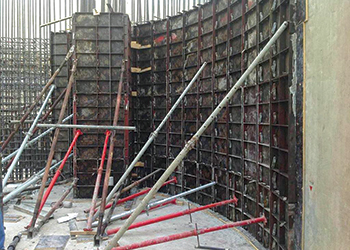 |
Paschal systems ... used to shape the curved ramp wall of the Najmat Residential Tower. |
Paschal modular panel systems provide a number of benefits, particularly in the construction of vertical elements on any type of concrete structure including water tanks, columns, shear walls and core walls, says Delghandi.
Set up in 1997 as the main office for the Middle East, Paschal Concrete Forms has since become one of the leading suppliers of modern formwork solutions to the construction industry in the GCC. Paschal has branch offices in the UAE in Abu Dhabi and Dubai, sales agents in Iraq and a Scientific and Technical Office in Dammam, Saudi Arabia.
The Bahrain operation moved into its purpose-built premises in June 2010 at the Bahrain International Investment Park (BIIP) in Hidd, where it has a production facility for modular formwork and a stockyard.
To cater to the demand for greater versatility in construction, Paschal recently launched a new adjustable modular column formwork on the GCC market. The variable modular column formwork aims to meet the requirements of various countries where reinforced concrete skeleton construction is dominant, says Delghandi.
Elaborating on the system, he says: “This system expansion allows clients to form square as well as rectangular reinforced concrete columns with external dimensions from 20 to 50 cm in increments of 5 cm. It is designed to build dependable column forms in varying lengths, widths and heights in a short time using a small number of light panels. If special requirements are additionally placed on the column edges, chamfer angles or sealing strips can be inserted in the corners of the formwork and fixed there.”
The panels come in heights of 100 cm, 125 cm and 150 cm and have a fixed width of 60 cm. The modular column panel, with its dimensions of 60 by 150 cm, has a deadweight of less than 40 kg, so it can be easily handled by two people. The height of the modular column panels can be extended by fastening them one below the other using the keybolts. Connection holes have already been made in the frame profiles and plywood to provide a force-fit corner connection with locking screws.
The prepared holes in the 15-mm-thick phenolic resin-coated plywood are sealed at the factory with PVC (polyvinyl chloride) plugs, which simply have to be popped out at the construction site. The locking screw fits through the two parallel opposing holes so that it can be hammered in from the outside as usual. The modular column formwork system is configured for a maximum fresh concrete pressure of 60 kN per sq m in accordance with DIN 18218.
Paschal also offers supports and adjustable props with suitable connecting and fastening accessories for aligning the formwork units.
The company is a sought-after partner for concrete projects worldwide, with customers in more than 40 countries and 50 years of experience.





















_0001.jpg)


.jpg)
















.jpg)








.jpg)



